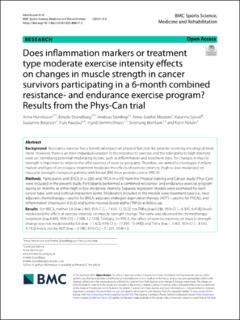| dc.contributor.author | Henriksson, Anna | |
| dc.contributor.author | Strandberg, Emelie | |
| dc.contributor.author | Stenling, Andreas | |
| dc.contributor.author | Mazzoni, Anne-Sophie | |
| dc.contributor.author | Sjövall, Katarina | |
| dc.contributor.author | Börjeson, Sussanne | |
| dc.contributor.author | Raastad, Truls | |
| dc.contributor.author | Demmelmaier, Ingrid | |
| dc.contributor.author | Berntsen, Sveinung | |
| dc.contributor.author | Nordin, Karin | |
| dc.date.accessioned | 2023-05-16T10:34:42Z | |
| dc.date.available | 2023-05-16T10:34:42Z | |
| dc.date.created | 2023-02-23T21:34:23Z | |
| dc.date.issued | 2023 | |
| dc.identifier.citation | Henriksson, A., Strandberg, E., Stenling, A., Mazzoni, A.-S., Sjövall, K., Börjeson, S., Raastad, T., Demmelmaier, I., Berntsen, S. & Nordin, K. (2023). Does inflammation markers or treatment type moderate exercise intensity effects on changes in muscle strength in cancer survivors participating in a 6-month combined resistance- and endurance exercise program? Results from the Phys-Can trial. BMC sports science, medicine and rehabilitation, 15, 1-11. doi: | en_US |
| dc.identifier.issn | 2052-1847 | |
| dc.identifier.uri | https://hdl.handle.net/11250/3068175 | |
| dc.description.abstract | Background: Resistance exercise has a beneficial impact on physical function for patients receiving oncological treatment. However, there is an inter-individual variation in the response to exercise and the tolerability to high-intensity exercise. Identifying potential moderating factors, such as inflammation and treatment type, for changes in muscle strength is important to improve the effectiveness of exercise programs. Therefore, we aimed to investigate if inflammation and type of oncological treatment moderate the effects of exercise intensity (high vs. low-moderate) on muscular strength changes in patients with breast (BRCA) or prostate cancer (PRCA). Methods: Participants with BRCA (n = 286) and PRCA (n = 65) from the Physical training and Cancer study (Phys-Can) were included in the present study. Participants performed a combined resistance- and endurance exercise program during six months, at either high or low-moderate intensity. Separate regression models were estimated for each cancer type, with and without interaction terms. Moderators included in the models were treatment type (i.e., neo/adjuvant chemotherapy—yes/no for BRCA, adjuvant androgen deprivation therapy (ADT)—yes/no for PRCA)), and inflammation (interleukin 6 (IL6) and tumor necrosis factor-alpha (TNFα)) at follow-up. Results: For BRCA, neither IL6 (b = 2.469, 95% CI [− 7.614, 12.552]) nor TNFα (b = 0.036, 95% CI [− 6.345, 6.418]) levels moderated the effect of exercise intensity on muscle strength change. The same was observed for chemotherapy treatment (b = 4.893, 95% CI [− 2.938, 12.724]). Similarly, for PRCA, the effect of exercise intensity on muscle strength change was not moderated by IL6 (b = − 1.423, 95% CI [− 17.894, 15.048]) and TNFα (b = − 1.905, 95% CI [− 8.542, 4.732]) levels, nor by ADT (b = − 0.180, 95% CI [− 11.201, 10.841]). Conclusions: The effect of exercise intensity on muscle strength is not moderated by TNFα, IL6, neo/adjuvant chemotherapy, or ADT, and therefore cannot explain any intra-variation of training response regarding exercise intensity (e.g., strength gain) for BRCA or PRCA in this setting. | en_US |
| dc.language.iso | eng | en_US |
| dc.publisher | BioMed Central (BMC) | en_US |
| dc.rights | Navngivelse 4.0 Internasjonal | * |
| dc.rights.uri | http://creativecommons.org/licenses/by/4.0/deed.no | * |
| dc.title | Does inflammation markers or treatment type moderate exercise intensity effects on changes in muscle strength in cancer survivors participating in a 6-month combined resistance- and endurance exercise program? Results from the Phys-Can trial | en_US |
| dc.type | Peer reviewed | en_US |
| dc.type | Journal article | en_US |
| dc.description.version | publishedVersion | en_US |
| dc.rights.holder | © 2023 The Author(s) | en_US |
| dc.subject.nsi | VDP::Medisinske Fag: 700::Idrettsmedisinske fag: 850 | en_US |
| dc.source.pagenumber | 11 | en_US |
| dc.source.volume | 15 | en_US |
| dc.source.journal | BMC sports science, medicine and rehabilitation | en_US |
| dc.identifier.doi | 10.1186/s13102-023-00617-3 | |
| dc.identifier.cristin | 2128744 | |
| dc.relation.project | Swedish Cancer Society: 150841, 160483 | en_US |
| dc.relation.project | Swedish Research Council: KDB/9514 | en_US |
| dc.relation.project | The Nordic Cancer Union (2015) | en_US |
| dc.source.articlenumber | 8 | en_US |
| cristin.qualitycode | 1 | |

